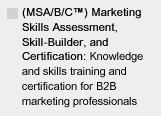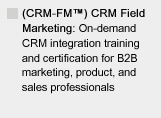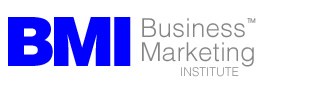MAKE SURE YOU CONTINUE TO RECEIVE EACH ISSUE OF TUESDAY MARKETING NOTES—CLICK HERE TO RENEW YOUR FREE SUBSCRIPTION (IF YOU'VE ALREADY SUBSCRIBED, NO NEED TO RE-SUBSCRIBE)

Ten Things Your Prospects Wish You Knew
Michele Linn, Linn Communications
I know you are busy and have an overflowing list of things to do, but I strongly believe there is one thing every marketer should make time for: really understanding your buyers so you can develop all content and promotions with them in mind. In last week’s issue of Tuesday Marketing Notes, I provided 20 questions to help you get to know your audience and create buyer personas.
While it is imperative to understand the specifics about your audience, you also need to realize that there are truths that exist for every prospect.
To make your job easier, here are ten things your prospect wished you knew.* If you use buyer personas and apply the concepts below to your marketing programs, the results can be quite astounding: your content will be more targeted, your promotions better received, and your connections more meaningful.
1) Make it easy for me to find information about you
Whenever I have a problem, I like to find quick answers. There are certain places where I typically look for information, and your prospects have these spots, too. For ideas on how to find your prospects online, check out Beyond Google: How to Find Your Prospects Online.
2) Use words I understand
The best B2B marketers I know have a knack for explaining things in very easy-to-understand terms. I admire these people greatly because it is much more difficult to explain things simply than it is to use big, academic words. I relate best to someone who can explain something to me using terms I understand, and your prospect does, too.
One of my favorite resources for identifying ineffective language is the Gobbledygook Grader developed by HubSpot and David Meerman Scott. If you aren't familiar with gobbledygook, these are the "jargon-laden phrases that are over-used in your industry" that Scott discussed in his 2007 e-book, "The Gobbledygook Manifesto" (a highly-recommended and quick read).
3) Tell me what's in it for me
Truthfully, people don't care what your products or services do; they want to understand how those products and services can help them solve their problems. Yes, this is something you hear all the time, but company-focused content is so rampant that this is a point worth repeating.
4) Understand where I am in the buying process and customize your follow up
In a post on Savvy B2B Marketing, Stephanie Tilton made a great point: "The way a prospective buyer approaches an issue doesn't neatly align with the way companies think of the buying process." I couldn't agree more.
Here's a great example of what not to do: I registered for a white paper a couple of weeks ago, and yesterday I received my first follow up email from the company. It was from an "inside sales coordinator" asking to set up a 30-45 minute demo with me. Seriously?! They have no idea why I downloaded the white paper, if I have any need for their solution or if I am in a position to buy, and they suggest that I invest 30 minutes of my time with them? While every company has a unique buying process, it typically does not progress from a white paper download to a live demo.
Here's a much better approach: In an interview with CRM guru Ardath Albee on the Marketbright blog, Albee recommends creating a buyer synopsis. She explains that the buyer synopsis is a "combination of a persona plus a problem-to-solution scenario. In other words, how would this type of buyer go about solving a specific problem your products can help them with? What are the questions they'd ask at each stage and what answers can you provide that propels them forward in that buying process?" Great idea! How many B2B marketers actually take the time to do this?
5) Remind me where I heard of you
I register for things all of the time. When I get an elusive follow up such as, “Thank you for contacting us,” or even the more specific but still vague “Thanks for downloading our white paper,” there is a good chance that I won’t quite recall what it is I registered for.
A better way to handle this is to be specific: “Thanks for registering for our white paper on 10 social media tips for B2B organizations.” Then, as a nice touch and for easy reference, include a link to the PDF of the paper, the webcast recording or whatever it is your prospect registered for.
6) Don't wait too long to contact me once we've established a connection
A few weeks ago I received an email from a local grocery store that stated I had expressed interest in getting email from them, and they were asking that I confirm my email address. I think this email stemmed from one of those frequent-shopper cards I registered for - about four months ago! Needless to say, I deleted the email as it is apparent they don't have a great email system in place. Granted, this is a B2C example, but the applications are the same.
7) I probably don't want to talk to you—at least not immediately
According to the TechTarget 2008 Media Consumption Benchmark Report, the best way to follow up with IT buyers after they've downloaded content is with online collateral (88% consider this favorable); the worst way is with a call from telemarketing (95.4% consider this unfavorable). The survey was specific to IT buyers, but it is noteworthy that the vast majority of respondents didn't want a phone call. Most of us hate phone calls (I never even provide my phone number), but it's common practice for telemarketers to follow up via a phone call after just one download.
8) But when I decide I want to make contact, make it easy for me
You never know how prospects are going to find or re-engage with you. It could be through a planned email or any page on your website. They could also be re-reading a white paper, watching a webinar or rediscovering a piece of direct mail you sent. You get the picture. Whatever you have that is prospect-facing, always make it easy for them to contact you for more information. This seems like another simple one, but it is amazing how often this doesn't happen.
9) Make sure your follow up process works and is relevant to me
Do you take the time to experience the download and follow up process as your prospect would? Go through the process using a non-business email. Not only does this ensure the system is working (are prospects directed to the right web pages and are they get the emails you intend?), but you also can get another perspective to see if you are leading your prospect down a logical path to a sale.
10) Help me understand how you are different
Several weeks ago, a colleague and I were researching email solutions. After we narrowed the list, we really wanted to understand how two of the competitors compared. While you would think this information should be somewhat easy-to-find, we really had to dig. Even when I was engaged on an online chat with one of the company reps and asked the pointed question, "How are you better than xyz competitor," this company didn't have a solid answer. After some searching, our best info was found on forums and blogs. Every company needs a quick and concise answer to this question.
While these tips may seem basic, I challenge you to put them to the test in your organization. Are there ways you can improve your prospect’s experience?
* Note: This list comes from a blog post I originally wrote for Savvy B2B Marketing called Eight Things Your Prospects Wish You Knew. I received some excellent comments and expanded my original list from eight to ten items. Thanks to Stephanie Tilton and Ardath Albee for the great additions.
Michele Linn (http://www.linncommunications.com/) is a freelance marketing writer specializing in white papers, research reports, feature articles, case studies, and other B2B communications. Her business is devoted to making the job of B2B marketers easier by producing buyer-focused content and providing insights on how they can market it. She is also a founding member and frequent contributor to the Savvy B2B Marketing blog (http://savvyb2bmarketing.com/blog). Send her an email (michele@linncommunications.com) or follow her on Twitter (http://twitter.com/michelelinn)








